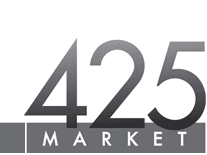Indoor
Environmental Quality
The
U.S. Environmental Protection Agency estimates that most Americans
spend about 90% of their day indoors. The vast majority of
those work in an office environment. Studies have shown that
Indoor Air Quality (IAQ) can be significantly worse than outside
air quality. Poor IAQ is a major concern as it can impact
the health, comfort, and productivity of the building occupants.
This category focuses on a building's strategies to improve
indoor air quality and occupant comfort levels.
- 425
Market St. has developed and implemented an Indoor Air Quality
(IAQ) management program based on the US Environmental Protection
Agency (EPA) standards. The purpose of the IAQ program is
to maintain a healthy and comfortable working environment
for building tenants. This is achieved through a set of
policies and procedures that concentrate on the following:
preventative maintenance of the building structures and
systems; controlling microbial growth; regulating construction
and renovation projects to meet the building Green Construction
Policy; and reducing contaminants indoors by using environmentally-friendly
products.
Preventative
maintenance plays the most vital role in preventing IAQ
problems. Preventative maintenance is the routine inspection,
adjustments or repairs of the building systems to make certain
the systems operate efficiently. Through scheduled maintenance,
potential problems are discovered and fixed in a timely
manner. In addition, 425 Market Street's environmental consultant,
Environova, performs an annual IAQ test of select floors
in the building. This test confirms that the IAQ meets
EPA I-BEAM and ASHRAE standards and exceeds the quality
of the air outside the building.
- 425
Market St. utilizes filters with a minimum efficiency reporting
value (MERV) of 14. MERV 14 filters have an 85% efficiency
rate which helps to reduce particulates circulating in the
air distribution. The maintenance of these filters is included
in the IAQ Best Management Practices program.
- 425
Market St. instituted a green cleaning policy. The policy
encourages the use of sustainable products and materials.
- The
building makes every effort to use cleaning products
that meet ECOLOGO standards. All products certified to an ECOLOGO standard must meet or exceed each of the listed criteria before receiving the mark. ECOLOGO Certification is classified as an ISO (International Organization for Standardization) Type 1 ecolabel and has been successfully assessed by the Global Ecolabeling Network, further demonstrating its credibility. This set of standards allows
buildings to make responsible choices in our purchases
that are environmentally friendly.
- The
building also uses green cleaning equipment like microfiber
mops and cloths and high-efficiency particulate air
(HEPA) filters in vacuums. Microfiber materials have
electrostatic properties that give them high dust-attracting
power that is helpful in effectively removing dust particulates.
The use of HEPA filters in vacuums improves the indoor
air quality of the building. HEPA filters remove at
least 99.97% of airborne particles that are 0.3 micrometers
in diameter.
|

